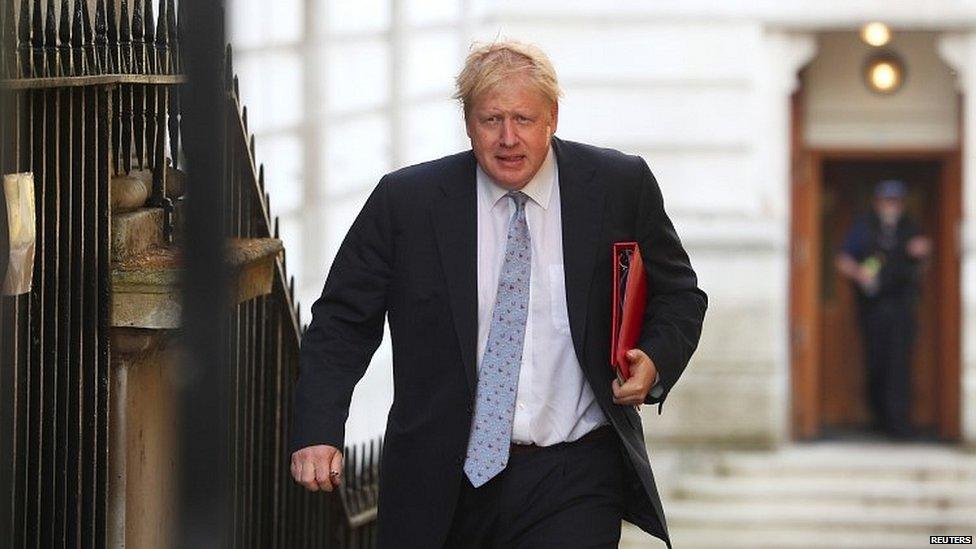Boris Johnson and the politics of Brexit
- Published

Did the foreign secretary threaten to resign and no one in SW1 really cared? Well, sort of.
Boris Johnson gave an interview on his trip to Washington where he was trying to persuade President Trump not to pull out of the Iran nuclear deal.
Some of his less diplomatic efforts were aimed at home, rather than the West Wing, where he called his boss's preferred option for working out how customs function after Brexit as "crazy".
Yes, the "customs partnership" that Brexiteers believed they had killed off politically in a cabinet committee meeting last week but that the business secretary breathed life back into on TV on Sunday.
No 10 had said all along that both of its possible options were on the table, but both needed some more work.
As we discussed last week, this isn't just about whether either of these options are really viable. Remember the EU has already pretty much dismissed them as they stand, prior to the eagerly awaited "more work" that may be coming.
The hysterics are also about who is really calling the shots on Brexit. The unsuspecting voting public who made their decision nearly two years ago might feel entitled to ask what on earth is going on.
In normal times - when did we last have them? - if a cabinet minister publicly criticised the government of the day's policy in such colourful terms, they would be out, either by their own volition, or a P45 swiftly despatched from Downing Street.
This is a policy that Boris Johnson discussed, along with his colleagues, at that Chequers away day in February, and then by (literally) giving the thumbs up to the prime minister's Mansion House speech in March that included the customs partnership as a potential proposal.
What his supporters say is that the policy was not agreed then and not discussed in proper detail, so by staking his claim that the idea is "crazy", he is not bound by collective responsibility. This is an idea floating around rather than pinned-down government policy, they say.
The word is appallingly overused in politics but, let's put it in capitals, it is UNPRECEDENTED for a senior member of the government to pour such scorn on their government's own plan; one they themselves signed up to not so long ago - not withstanding his team's belief that he is perfectly entitled to criticise a plan before there has been an official government decision to back it.
And his supporters point out, if the business secretary is perfectly able to make criticisms of the other option on the table, then why isn't he entitled to do the same?
But for some of his colleagues, this criticism, complete with its implicit threat to quit, is childish self-indulgence, the behaviour of the Eurosceptic "toddlers" (as described by a prominent Tory MP) screaming for more toast after they threw theirs on the kitchen floor, but it landed jam side down.
For some of his critics, it's a tired old tantrum, best ignored. An MP who knows Boris Johnson well shrugged this morning and remarked "does he really mean it this time?"
Well, maybe he does. These are not those fabled normal times. Yes, Boris Johnson signed up with the rest of the cabinet to the proposed customs partnership as one of the options after the transition period. But yes, he, like others, believed that at last week's cabinet committee, the argument for it had been lost.
And yes he, like some other Brexiteers, believes the proposal to be deeply flawed, so problematic as to almost make leaving the EU not worth it. It was one thing, so the argument goes, signing up to the idea in theory, but another backing it further down the track when there is still precious little detail.
There is a tangible mood among Eurosceptics, as last week's leaked memo from the Tory European Research Group revealed, that the customs partnership is the breaking point after months of compromise on their behalf. So this latest rattling from Boris Johnson, deliberately or not, speaks for them.
But maybe he doesn't and by the measure of some of the conversations I've been having this afternoon, it sounds like a departure is not at the forefront of his mind.
The foreign secretary didn't quit over paying the Brexit bill, he didn't quit over the implementation period.
If he has an eye on the future leadership prize, there is an advantage to staying in the team, with a big fancy job, to be seen to be fighting for the Eurosceptic version of Brexit, rather than sulking in a strop to the backbenches, to be the darling of a certain vigorous constituency, but the disloyal bête noire of everyone else.
It's not the first, or I suspect, the last time this question will be asked. Yes, you should care that the foreign secretary implied he might resign, but maybe just not that much, just yet.